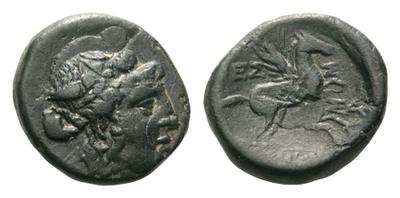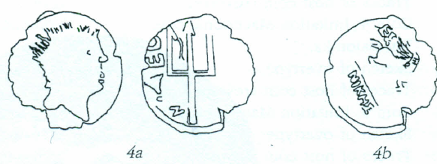168 BCE - 150 BCE | MAKEΔΟΝΩΝ (N…ΔEO…)
Overstriking coin
SO 905 - Amphipolis over Thessalonica.png
Overstruck variety
Thessalonica_Dionysos_Pegasus_Roma_Numismatics_336.jpg
[1]
Amphipolis over Thessalonica 905.png
Description
| ObverseInscription or printing placed on the obverse.:
|
Head of Strymon right, wearing reeds wreath.
|
ReverseInscription or printing placed on the reverse.:
|
MAKEΔΟΝΩΝ (N…ΔEO…) (Greek) Trident orned with dolphins. In fields, monograms.
|
Mint and issuing power
| MintIdentifies the place of manufacture or issue of a numismatic object.:
|
Amphipolis
|
Ancient regionAncient region.
|
Macedon
|
Modern countryModern country: Greece
|
AuthorityIdentifies the issuing power. The authority can be "pretended" when the name or the portrait of X is on the coin but he/she was not the issuing power. It can also be "uncertain" when there is no mention of X on the coin but he/she was the issuing power according to the historical sources:
|
Roman Republic, Roman province of Macedonia
|
Chronology
| FromIdentifies the initial date in a range assigned in a numismatic context. 168 BCE toIdentifies the final date in a range assigned in a numismatic context.. 150 BCE
|
Hellenistic 323-30 BC  periodTime period of the numismatic object. periodTime period of the numismatic object.
|
Physical description
MetalThe physical material (usually metal) from which an object is made.: Bronze 
|
WeightWeight of the numismatic object (in grams). in grams: 7.777.77 g <br />7,770 mg <br />
|
|
AxisDescribes the directional relationship between the obverse and reverse of a numismatic object.: 1111 mm <br />1.1 cm <br />
|
| DiameterDescribes diameter of an object (in mm).: 2121 mm <br />2.1 cm <br />
|
|
References
| Coin referenceReference of the Coin:
|
MacDonald 1998, p. 100, n° 1, pl. 1, n° 4
|
Coin series referenceReference to coin series study:
|
Gaebler 19351Gaebler 1935, p. 35-37, n° 59-63, MacDonald 19982MacDonald 1998, p. 100, n° 1, pl. 1, n° 4, HGC 3.13HGC 3.1, n° 334
|
| Coin series web referenceCoin series web references:
|
|
Description
| ObverseInscription or printing placed on the obverse.:
|
Head of Dionysos right, wearing ivy wreath (visible: slight traces).
|
ReverseInscription or printing placed on the reverse.:
|
(Θ)ΕΣ(ΣΑΛΟ)ΝΙΚΗΣ (Greek) Pegasos right. In right field, ear of grain.
|
Mint and issuing power
Chronology
| FromIdentifies the initial date in a range assigned in a numismatic context. 187 BCE toIdentifies the final date in a range assigned in a numismatic context.. 168 BCE
|
Hellenistic 323-30 BC  periodTime period of the numismatic object. periodTime period of the numismatic object.
|
Physical description
References
| Coin type referenceReference to coin series study ᵖ:
|
Gaebler 19351Gaebler 1935, p. 118, n° 4, Lindgren 19934Lindgren 1993, n° 1151, Touratsoglou 19935Touratsoglou 1993, pl. IX.3, HGC 3.13HGC 3.1, n° 724, Kourempanas 20166Kourempanas 2016, n° 6
|
| Coin series web reference overstruckCoin series web references overstruck:
|
|
References
- a b Gaebler, Hugo (1935), Die antiken Münzen Nord-Griechenlands, unter Leitung von Theodor Wiegand. Band III, Makedonia und Paionia. 2. Abt., Verlag W. de Gruyter, Berlin
- ^ MacDonald, David (1998), "Overstrikes of Macedonian bronze coins," Nomismatika Chronika 17, p. 97-107.
- a b Hoover, Oliver D. (2016), Handbook of coins of Macedon and its neighbors. 3. Part I: Macedon, Illyria, and Epeiros, sixth to first centuries BC, Lancaster, 437 p.
- ^ Lindgren, H. C. (1993), Ancient Greek Bronze coins from the Lindgren collection, Chrysopylon, Quarryville, 204 p.
- ^ Touratsoglou, Ioannis (1993), The coin circulation in Ancient Macedonia (ca. 200 B.C.-268-286 A.D.), The hoard evidence, Athens, Hellenic numismatic Society, in-4°, 88 p., XIII pl.
- ^ Kourempanas, Theodoros (2016), "Τα ελληνιστικά νομίσματα της Θεσσαλονίκης" , Athens, p. 112, pl. 13.
 Traces of the overstruck variety
Traces of the overstruck variety

